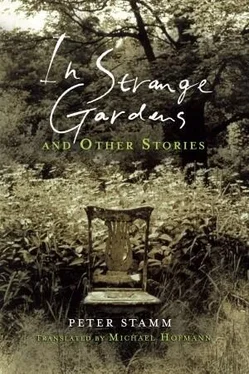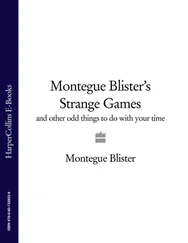The sky was overcast, but it hadn’t begun raining yet. The light railway was unmanned. At first, David didn’t notice, then he was a little disquieted by it. The trains went past each other, apparently undirected, remote-controlled from some hub God knows where.
Without picking it up, David scanned a story in the newspaper that had been left in the seat opposite. A child’s body had been found near Tower Bridge. A colored boy of five or six was drifting in the river. A passerby had spotted the body. The child had had his arms and legs cut off. The man who had found it was receiving psychological counseling.
There was a little park at the end of the Isle of Dogs. David stared across the Thames at the white buildings on the other side of the river. They looked powerful and silent, as if out of some other time, some better time. At the top of the hill stood the observatory, where, as David had read in his guide, a red ball was lowered every day at twelve o’clock. Once, ships had set their clocks by this ball. Today the only reason it was lowered was because it had always been lowered.
Tower Bridge was upstream. When David saw the muddy water of the Thames sliding past, he had to think of the dead boy. The notion of having to walk under the river was suddenly intolerable to him.
David went shopping. Everything was incredibly expensive.
He stacked the things in his empty kitchen cupboards and refrigerator. It was soothing to see so much food. This can keep me going for at least two weeks, he thought to himself. He might get through one or another thing, like the milk, but at least he wouldn’t starve. And then, when his supplies were used up, he could go on for probably another month. He tried to remember for how long hunger-strikers stayed alive, when the newspapers wrote about such people. Was it seven weeks? Eight?
In the afternoon he went back to the supermarket, and bought more food. This time, he had an eye on long life. He bought powdered milk and canned vegetables, chocolate, and deep-frozen ready meals.
On Sunday, David called his father. His father didn’t ask him any questions. He talked about the neighbor’s cat, which had been run over by a truck. He had found it outside his garden gate, it had been completely flat, rolled out, there was hardly any blood on it. The misfortune seemed to amuse his father.
“Here, they found the body of a kid drifting in the river,” said David, “it had no arms and no legs.”
He was still talking when he switched on the TV. He flicked through the channels till he found a program that showed a Japanese man passing his hand three or four inches above the naked body of a Japanese woman. The woman seemed to be becoming aroused by it, even though her eyes were shut and she couldn’t see what was going on. David said goodbye to his father, and turned up the sound. The Japanese man was talking about the transference of sexual energy. The whole thing was some pseudo-scientific investigation; obviously, the only thing that mattered was showing images of naked women.
The ostensible scientist had something else up his sleeve. This time he set another naked woman, Japanese again, in front of a television screen that was showing images of a Japanese couple copulating. This second woman was wearing headphones. She showed clear signs of sexual excitement. The original Japanese woman was still lying on the bed next door, and she was very excited too, even though nothing was being done to her, or perceivable to her. The scientist explained that the sexual energy transferred itself from the first woman to the second. How and by what means this transference occurred he did not explain.
The two Japanese women had the generic ugliness of European or American performers in porn films that David had seen from time to time. That is, they didn’t have ugly faces, or ugly bodies. It seemed rather to be some kind of inner ugliness, lubricity or squalor. He remembered one film, in which naked women had been wrapped in cling wrap. He switched off the TV. Cling wrap, he put down on his shopping list.
He thought of the Japanese woman next door to him, tried to fix his concentration on her. His hand moved back and forth over her naked body. He liked the idea that his neighbor was lying on her own bed in her own flat, feeling some energy reaching her from somewhere, exciting her in some irresistible way. But he wondered whether his own state of excitement had any influence on the Japanese woman.
Then he thought about the dead kid that had been found. He was curious to learn more about the case. That seemed to him the priority just then. He left his apartment. He spent a long time looking for a newsstand. The newspaper, when he finally found one, didn’t have much more information than he already knew.
The police had christened the little boy Adam, and there was talk about a violent end. The boy was wearing orange shorts, and it was thought he had been in the water for about ten days. There were strangulation marks on his neck. A police inspector told the newspaper he had never come across a similar case, and he vowed to keep on at the case until the riddle was solved.
The riddle consisted of seven half-burned-down candles that had been found on the banks of the Thames. They were wrapped in a white cloth that had a name on it. The name was Adekoye Jo Fola Adeoye, and it was thought to be fairly common in Nigeria, he read.
David considered going to Tower Bridge, but then he changed his mind. He was unable to picture the dead boy. Each time he tried, he couldn’t do any better than those pictures that were screened to elicit contributions to famine charities.
He wondered if anyone would look for him if he failed to show up to work on Monday. Presumably Rosemary would be sent. She didn’t have a key to the apartment, as she stressed. If he didn’t open the door and let her in, she would have to go away, and try again the next day. The police wouldn’t be alerted until three or four days had passed. First they would ring, then the super would unlock the door. The police were the first to step inside, followed by the super and Rosemary. She screamed, a short, stifled scream, and then threw herself round the super’s neck. It was like in the movies. The policemen would make long, serious faces. David’s body would be lying on the bed, arms and legs severed, the sheets soaked with blood. His trunk would be buried in a normal-sized coffin, even though a child’s coffin would have done.
David sat in his living room. He was full of a wild rage, a rage against the people who had killed and mutilated the innocent boy. He wanted to do something, to bring about some change. But the people who understood the world didn’t do anything to change it. And the people who changed the world, didn’t understand it. David wasn’t sure whether he himself understood anything or not. He was just sure he wouldn’t ever change anything. He could picture himself dropping the TV set off the balcony into the park, or taking an ax to the Hansgrohe fittings in the bathroom. With a single blow, he shattered the washbasin. Water spurted from the pipes. He ripped down the shower curtains, he attacked the mirror with his ax, and it shattered into a thousand pieces. He swept the crockery out of the kitchen cupboards, and knocked over the refrigerator. The TV exploded at the foot of the building. Blood splashed down onto the carpet.
David dropped to his knees. He ran his fingers through the carpet tassels. He lay on the carpet, writhing like a sick animal. He thought of the dead cat, the mutilated boy, the Japanese women and the pseudoscientist, and the man with the kite. He thought about building a kite with his father as a boy. He saw his father’s expression, the concentration and the careful movements with which he assembled the pieces of wood and draped the colorful silk paper over them, fixed the string to the cross. When they flew the kite, David felt as though it was he himself who was speeding up into the air, steered but barely held by the frail string his father held in his hands.
Читать дальше












